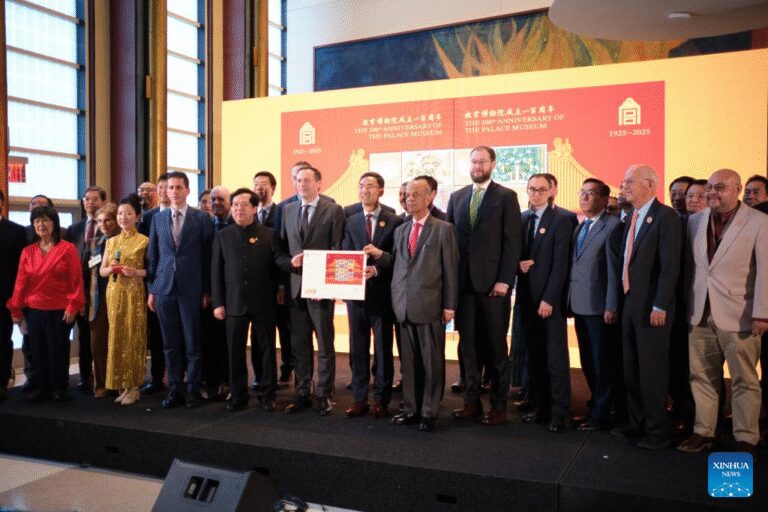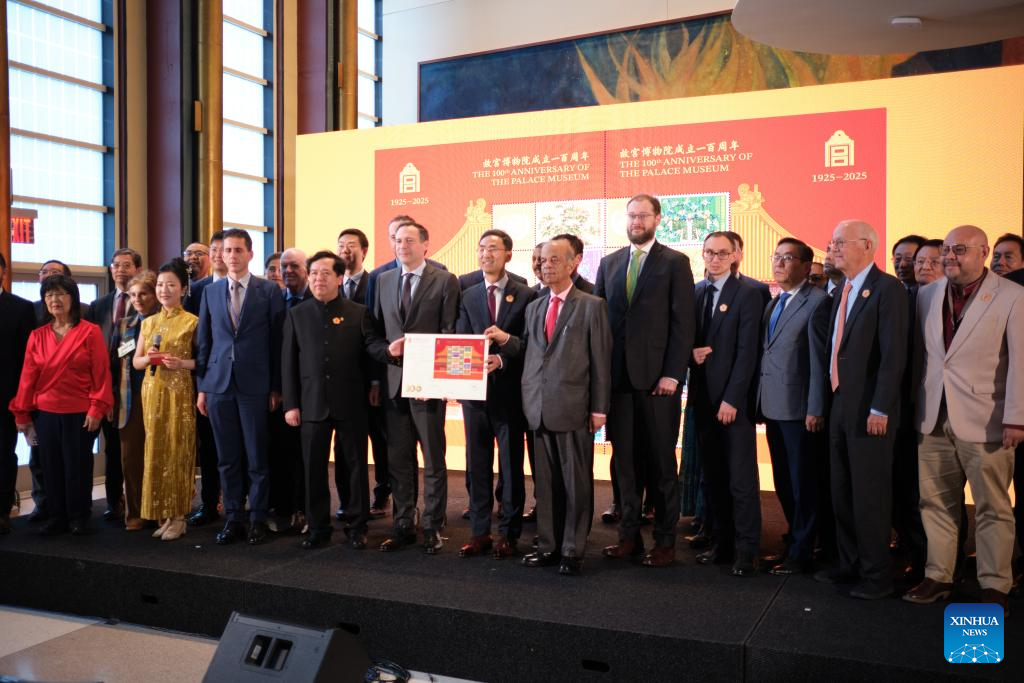
Guests display a commemorative UN stamp sheet marking the 100th anniversary of the Palace Museum at the UN headquarters in New York, May 19, 2025. The Forbidden City, once the seat of Chinese emperors, was honored on the global stage on Monday as diplomats, UN officials and cultural leaders gathered at UN Headquarters to celebrate the centennial of the Palace Museum. The occasion featured the unveiling of a commemorative UN stamp sheet and the opening of the “Endless Vitality” exhibition, co-hosted by the Palace Museum and the UN Chinese Book Club, with support from the United Nations’ Global Sustainable Development Goals and Leadership Development Center. (Xinhua)
UNITED NATIONS, May 20 (Xinhua) — The Forbidden City, once the seat of Chinese emperors, was honored on the global stage on Monday as diplomats, UN officials and cultural leaders gathered at UN Headquarters to celebrate the centennial of the Palace Museum.
The occasion featured the unveiling of a commemorative UN stamp sheet and the opening of the “Endless Vitality” exhibition, co-hosted by the Palace Museum and the UN Chinese Book Club, with support from the United Nations’ Global Sustainable Development Goals and Leadership Development Center.
Geng Shuang, charge d’affaires of China’s permanent mission to the United Nations, said that the newly issued UN Postal Administration stamps not only mark the 100th anniversary of the Palace Museum, but also showcase “the enduring charm of Chinese culture to the world.”
He emphasized that just as cultural relics require dedicated restorers, the United Nations, an 80-year-old institution, also needs the world to work together not just to restore it, but to revitalize it for the new era, “to help it to make greater contributions to world peace, common development and civilization exchanges.”
UN Under-Secretary-General for Operational Support Atul Khare highlighted the unique and powerful role of museums as “places where culture lives, where stories are told, and where people come together to learn and connect. They preserve our past, help us understand our present, and inspire our future.”
He praised the Palace Museum as “one of the world’s great cultural institutions,” and commended its work in giving Chinese heritage new meaning in today’s world. “Through its exhibitions, research, and international collaborations, the Palace Museum has brought Chinese civilization into conversation with the world.”
Eliot Minchenberg, director of the UNESCO Liaison Office in New York and UNESCO representative to the United Nations, described the Palace Museum as “a guardian of Chinese heritage” and “a testament to the richness of human experience.”
He noted that its 1987 inscription on the UNESCO World Heritage List symbolizes the long-standing partnership between UNESCO and China.
“The stamps we unveil today should serve not only as symbols of commemoration, but as invitations to celebrate our shared heritage, and to draw strength from our cultural roots as we look ahead together,” he said.
Wang Yuegong, deputy director of the Palace Museum, said that in recent years, the Palace Museum’s cultural and creative products have embraced sustainable values, including eco-friendly design, intangible heritage protection and rural revitalization, offering “a unique cultural perspective in support of the UN Sustainable Development Goals.” ■

Geng Shuang (2nd R), charge d’affaires of China’s permanent mission to the United Nations, UN Under-Secretary-General for Operational Support Atul Khare (1st R), Eliot Minchenberg (2nd L), director of the UNESCO Liaison Office in New York and UNESCO representative to the United Nations, and Wang Yuegong, deputy director of the Palace Museum, display a commemorative UN stamp sheet marking the 100th anniversary of the Palace Museum at the UN headquarters in New York, May 19, 2025.
The Forbidden City, once the seat of Chinese emperors, was honored on the global stage on Monday as diplomats, UN officials and cultural leaders gathered at UN Headquarters to celebrate the centennial of the Palace Museum.
The occasion featured the unveiling of a commemorative UN stamp sheet and the opening of the “Endless Vitality” exhibition, co-hosted by the Palace Museum and the UN Chinese Book Club, with support from the United Nations’ Global Sustainable Development Goals and Leadership Development Center. (Photo by Zhou Huanxin/Xinhua)
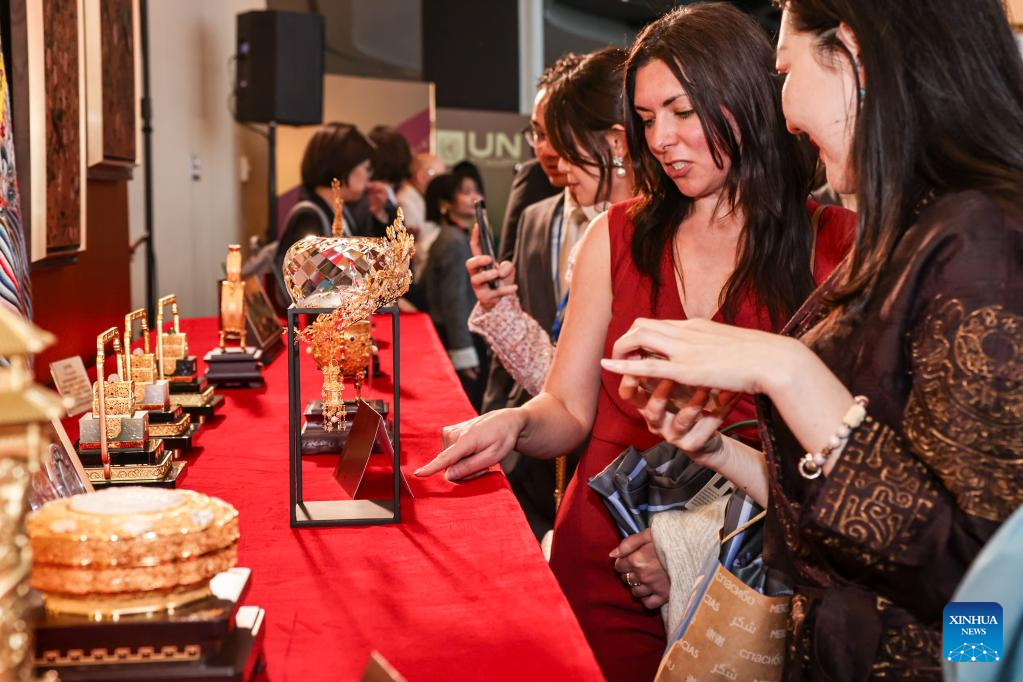
People visit the “Endless Vitality” exhibition at the UN headquarters in New York, May 19, 2025.
The Forbidden City, once the seat of Chinese emperors, was honored on the global stage on Monday as diplomats, UN officials and cultural leaders gathered at UN Headquarters to celebrate the centennial of the Palace Museum.
The occasion featured the unveiling of a commemorative UN stamp sheet and the opening of the “Endless Vitality” exhibition, co-hosted by the Palace Museum and the UN Chinese Book Club, with support from the United Nations’ Global Sustainable Development Goals and Leadership Development Center. (Photo by Zhou Huanxin/Xinhua)
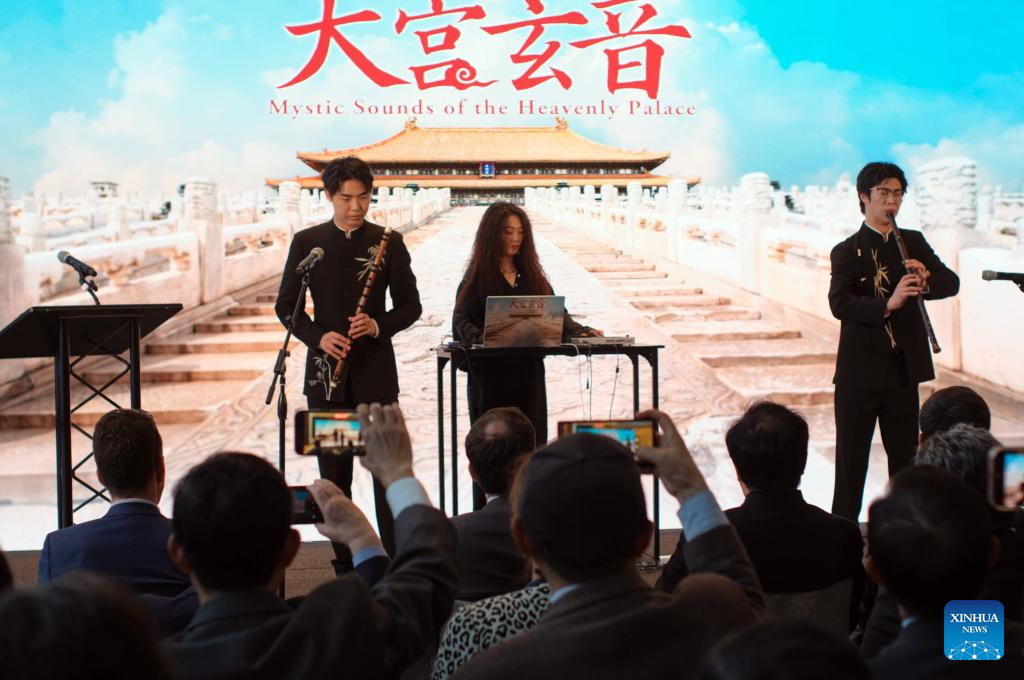
Musicians stage a performance during the “Endless Vitality” exhibition at the UN headquarters in New York, May 19, 2025.
The Forbidden City, once the seat of Chinese emperors, was honored on the global stage on Monday as diplomats, UN officials and cultural leaders gathered at UN Headquarters to celebrate the centennial of the Palace Museum.
The occasion featured the unveiling of a commemorative UN stamp sheet and the opening of the “Endless Vitality” exhibition, co-hosted by the Palace Museum and the UN Chinese Book Club, with support from the United Nations’ Global Sustainable Development Goals and Leadership Development Center. (Xinhua)
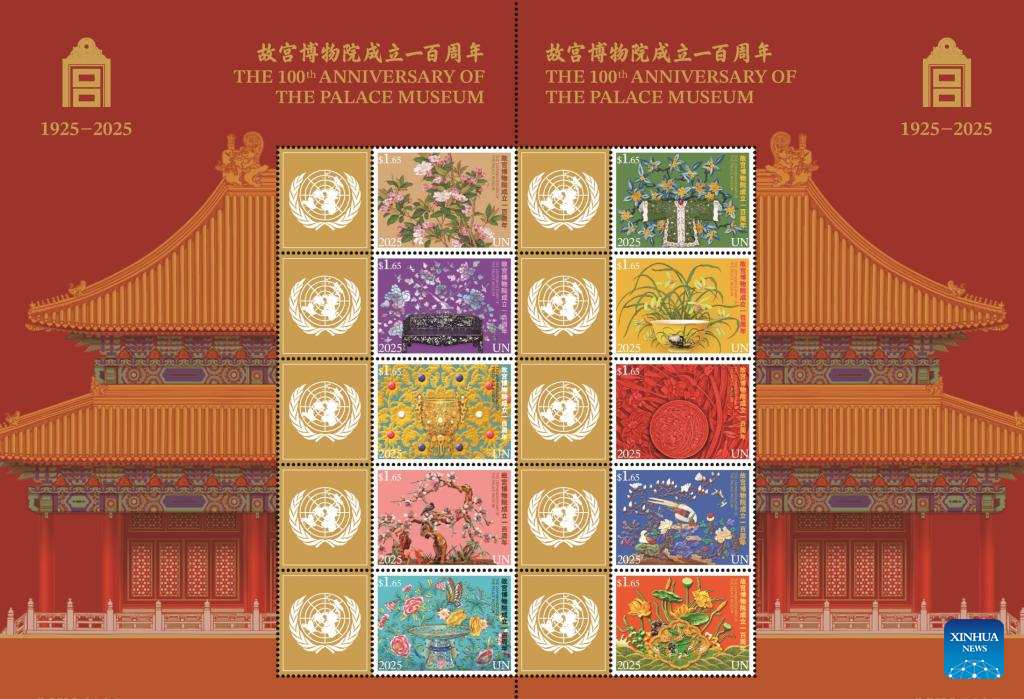
This image shows a commemorative UN stamp sheet marking the 100th anniversary of the Palace Museum.
The Forbidden City, once the seat of Chinese emperors, was honored on the global stage on Monday as diplomats, UN officials and cultural leaders gathered at UN Headquarters to celebrate the centennial of the Palace Museum.
The occasion featured the unveiling of a commemorative UN stamp sheet and the opening of the “Endless Vitality” exhibition, co-hosted by the Palace Museum and the UN Chinese Book Club, with support from the United Nations’ Global Sustainable Development Goals and Leadership Development Center. (Xinhua)

